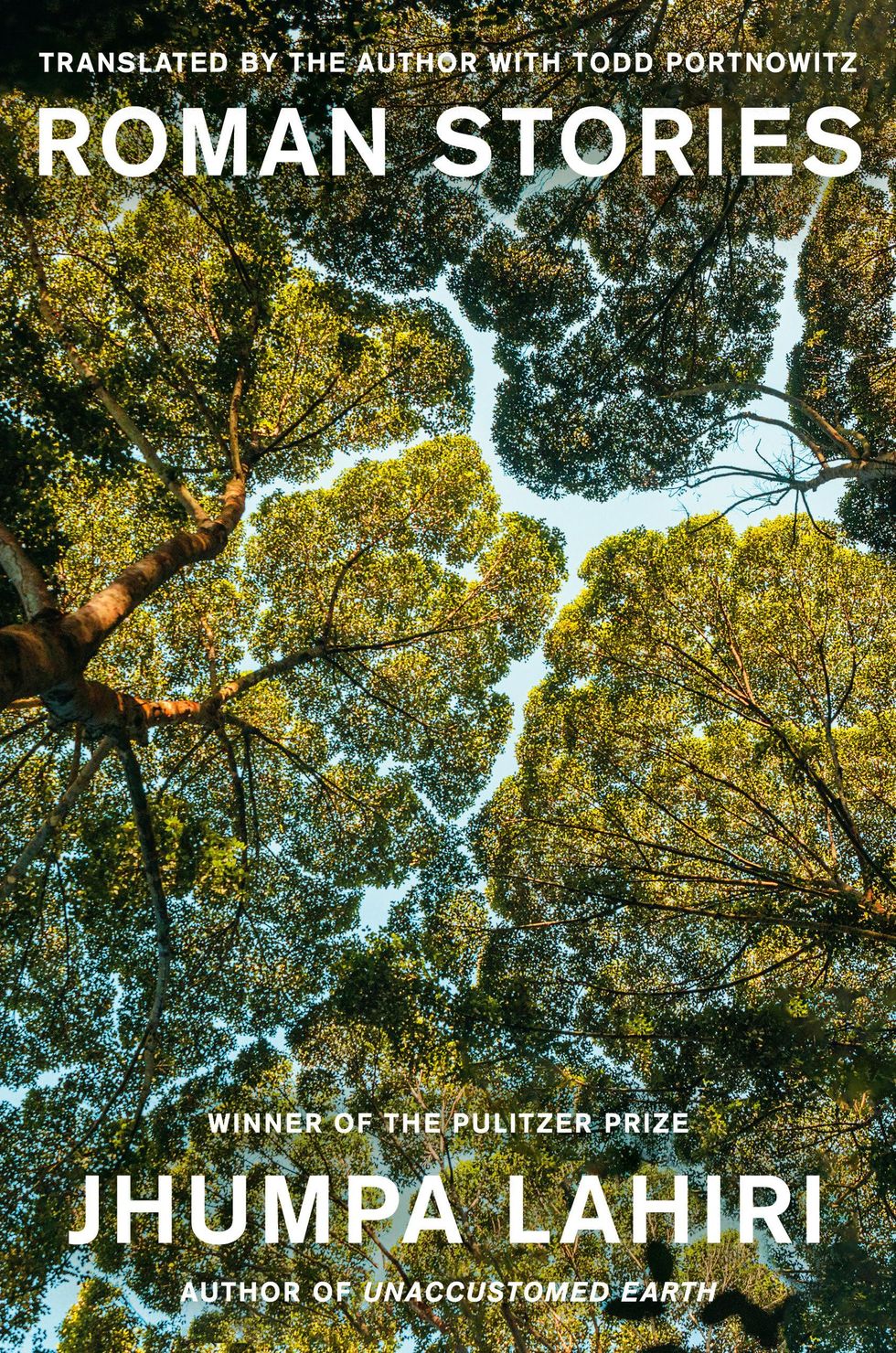For the last decade, Jhumpa Lahiri has committed herself to writing in Italian, the language she fell in love with during a trip to Florence with her sister in 1994. She then moved herself and her family to Rome in 2012, giving up English entirely while dedicating herself to Italian completely. Since then, the Pulitzer Prize winner has released several works in Italian, including a memoir, poetry collection, novel, and her recently published short story collection, Roman Stories.
Roman Stories presents a mosaic of fictional narratives illustrating each protagonist’s struggles, heartbreaks, and triumphs. Within the first part of this collection, we hear from a caretaker who oversees the maintenance of a country house on the outskirts of Rome (“The Boundary”), and then we are bystanders at a lunch between long-lost friends, each with their own wounds (“The Reentry”). In “P’s Parties,” we follow a husband as he accompanies his wife to her friend P’s annual soiree and bonds with a fellow guest. The story, published by The New Yorker in July, was one of the first stories Lahiri wrote in Italian. “The story just sort of came to me,” Lahiri says. “I think about the different kinds of people who pass in and out of the city and inhabit the city and how stratified the city is demographically.”
This is best seen in part two of the collection, which contains a single story, “The Steps.” The tale is set in a Roman neighborhood, around a large staircase that leads to the city’s streets. Each of its six parts reveals a piece of life lived near these stairs. Some of these narratives come from current or former residents of the neighborhood, while others come from passersby who spot the staircase as they roam the city. With a multitude of perspectives, Lahiri composes “a fresco” of characters and experiences.
More From ELLE

As one will notice, these stories give a voice to the onlookers and the ostracized. “I’ve always been writing about people on the margins and I’ve always been talking about foreigners. I’ve always been writing about people who feel like foreigners,” Lahiri tells ELLE.com. “That’s really what the stories are about, and that’s really what I think all of my writing has been about over the past 20 years.”
Ahead, the author details her experiences with writing in another language and building her latest collection of short stories.
I’d like to touch on how you ideated the characters in these stories. Are they based on the people you met while you lived in Rome, or perhaps yourself?
It’s always a combination of people you look at on the street and wonder what their lives might be like or something you overhear or something you witness or something you experience and then the characters are composites, right? There are characters in the book who have seemingly very little to do or little in common with my life and yet perhaps there’s an element in their experience that I experienced, right? So the characters aren’t based on any one person, whether real or invented, it’s always a combination of elements that goes into building a character.
You allow these characters to remain nameless, aside from the occasional one-letter initial, P in “P’s Parties,” for example. Is there a reason why?
I find it interesting to take away elements of identity and to allow the characters to operate without the weight and limitations that a name can often bring to how characters read. And that’s something I’ve been doing now, in all of my Italian work. So from the beginning, the characters are either generic or sort of identified by initials or, on “The Steps”, for example, they are described by one aspect of them. So for example, the widow or the young girl, there’s one word used as a marker of who they are. While I should distinguish them from the other characters in the story, I find it interesting to take away specificity and to leave the reading more abstract and more open for the reader, because we are no longer able to immediately pinpoint sort of an origin for the character.
I read that “P’s Parties” was one of the first stories you worked on in Italian. How did the beginnings of that story come to be? And what made you want to tackle that story in Italian rather than in English?
Well, I was writing in Italian and I wasn’t writing anything in English at that moment. So there wasn’t really a choice. I mean, in that sense, everything was kind of happening in Italian. I had already written a few things that were Italian so I was already sort of inside of that space experimentally. I never thought about writing it in any other language. The story just sort of came to me. I lived in Rome and I think about the different kinds of people who pass in and out of the city and inhabit the city and how stratified the city is demographically.
Is there a significance to the order of the stories and how you separated them into parts?
I felt that was the best way. It’s just a matter of arranging it in a way that I think makes sense but then I know that people don’t respect that order. When they approach a book of short stories, some will be read out of order and will be the last ones read. It’s really not in my control. But given that I’m the author and did have a say in how to arrange the stories—I mean in terms of progression, there are stories written in the first person and a couple of stories written in the third person. I wanted to sort of alternate. I also wanted to alternate the perspective of the characters from younger to older, that kind of thing. “The Stairs” seemed very much like the center of the story, literally, kind of architecturally. The first story seemed to be the right way to begin the book—to talk about the idea of boundaries and what boundaries mean in life and in ourselves and within ourselves and between ourselves, nonetheless, the last story also seemed to be the right story to end with.
In the story “The Delivery,” you add the point of view of one of the boys who shot the protagonist of the story. Why did you decide to add his perspective?
I’m curious about all kinds of perspectives. I’m curious about the human condition. I’m curious about why someone would be intolerant of the presence of foreigners in their city or in their neighborhood and what would lead to those kinds of attitudes. I think that if we don’t ask ourselves why people are xenophobic or why people are afraid of change in their communities, we are losing the battle. We’re losing the battle because we have to open ourselves up to understand how these attitudes emerge. What are they feeding on? People perhaps have ambivalence about how they feel. So much xenophobia has to do with fear of change and fear of the unknown. And I think, you know, fear of change and fear of the unknown is really something all human beings experience to a greater or lesser degree. I’m not saying that we all ended up being xenophobic because of that. But I think that if we put up firewalls and say we’re not interested in people who think very differently—for me, it’s limiting to my way of thinking and trying to understand the world and trying to understand very difficult aspects of the world. Xenophobia is a very difficult and painful aspect of society, of all societies. So, it was very important for me to try to understand.
In the last story, “Dante Alighieri,” the protagonist develops this hyper-fixation with Alighieri and his words as a poet. This is then a jumping point to a new life that she starts. Did you by any chance have a writer that you were hyper-fixated with that led you towards this passion of writing in Italian?
No, I didn’t. I was obsessed with Shakespeare as an undergraduate. So if I had to point to the author that I was completely immersed in and thought deeply about and spent weekends holed up in my dorm room taking notes on and that kind of thing—that author for me was Shakespeare, not Dante. I didn’t really study Dante formally at all until much later. The story is very much imagining a young woman who would have had this intense relationship with Dante Alighieri, and how reading can be transformative. In that sense, yes I can completely put myself in her shoes because, of course, reading has been a transformative experience in my life. Reading different authors at different moments in my life has been transformative for me. So, I feel very close to her in that sense.
What advice would you give someone who wants to embark on a similar journey of writing in a second language?
Well, you have to have faith in your ignorance. You have to understand the paradoxical advantage of being limited. If you can get to that place, then I think that that type of barrier can be crossed. One can start imagining what it might be like to express oneself creatively in another language. But I think it really has to come from a very deep place because otherwise, it just becomes an exercise. But if it’s necessary, if it becomes a necessary mode, then it will perhaps take root. There are writers who write in more than two languages. There have been very interesting examples of writers who are bilingual or trilingual, who are born with the knowledge of more than one language, or who learned them for various reasons throughout their lives. So, there’s no advice I can really give other than completely shifting your perspective and understanding of what it means to write and what language is.
This interview has been edited and condensed.
